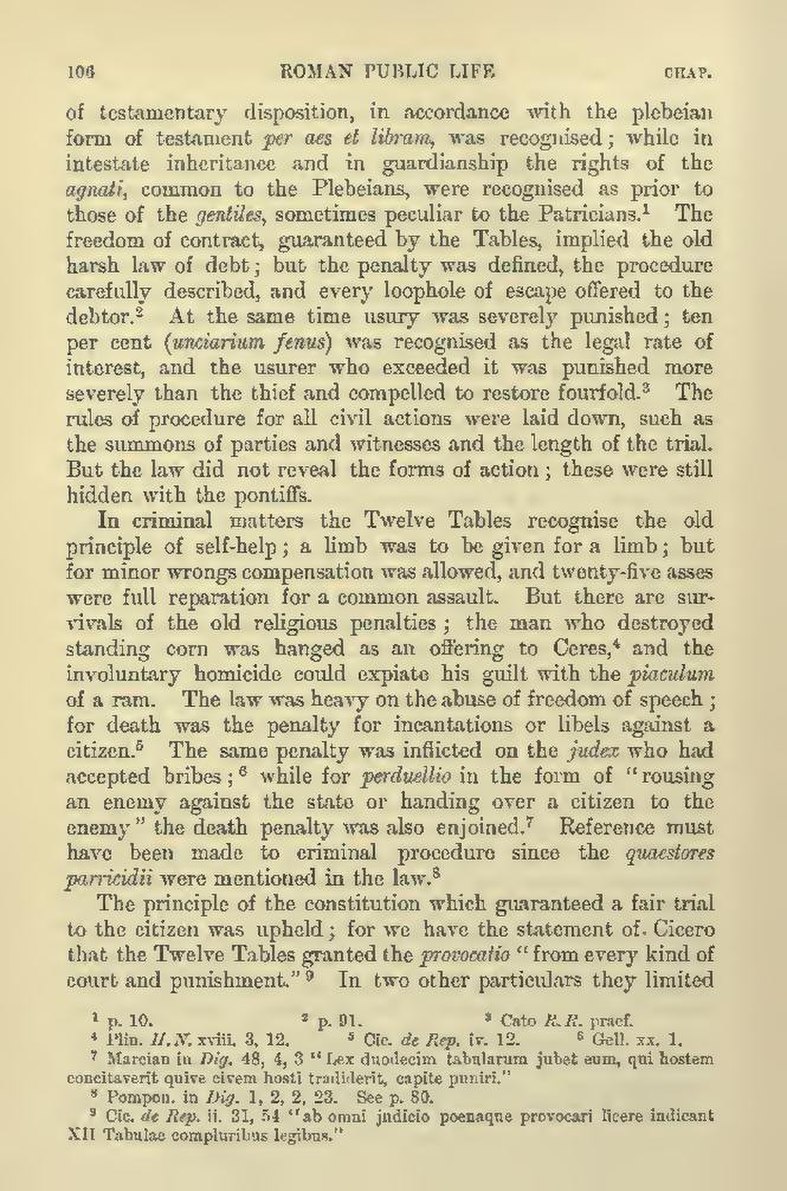of testamentary disposition, in accordance with the plebeian form of testament per aes et libram, was recognised; while in intestate inheritance and in guardianship the rights of the agnati, common to the Plebeians, were recognised as prior to those of the gentiles; sometimes peculiar to the Patricians.[1] The freedom of contract, guaranteed by the Tables, implied the old harsh law of debt; but the penalty was defined, the procedure carefully described, and every loophole of escape offered to the debtor.[2] At the same time usury was severely punished; ten per cent (unciarium fenus) was recognised as the legal rate of interest, and the usurer who exceeded it was punished more severely than the thief and compelled to restore fourfold.[3] The rules of procedure for all civil actions were laid down, such as the summons of parties and witnesses and the length of the trial. But the law did not reveal the forms of action; these were still hidden with the pontiffs.
In criminal matters the Twelve Tables recognise the old principle of self-help; a limb was to be given for a limb; but for minor wrongs compensation was allowed, and twenty-five asses were full reparation for a common assault. But there are survivals of the old religious penalties; the man who destroyed standing corn was hanged as an offering to Ceres,[4] and the involuntary homicide could expiate his guilt with the piaculum of a ram. The law was heavy on the abuse of freedom of speech; for death was the penalty for incantations or libels against a citizen.[5] The same penalty was inflicted on the judex who had accepted bribes;[6] while for perduellio in the form of "rousing an enemy against the state or handing over a citizen to the enemy" the death penalty was also enjoined.[7] Reference must have been made to criminal procedure since the quaestores parricidii were mentioned in the law.[8]
The principle of the constitution which guaranteed a fair trial to the citizen was upheld; for we have the statement of Cicero that the Twelve Tables granted the provocatio "from every kind of court and punishment"[9] In two other particulars they limited
- ↑ p. 10.
- ↑ p. 91.
- ↑ Cato R.R. praef.
- ↑ Plin. H.N. xviii. 3, 12.
- ↑ Cic. de Rep. iv. 12.
- ↑ Gell. xx. 1.
- ↑ Marcian in Dig. 48, 4, 3 "Lex duodecim tabularum jubet eum, qui hostem concitaverit quive civem hosti tradiderit, capite puniri."
- ↑ Pompon. in Dig. 1, 2, 2, 23. See p. 80.
- ↑ Cic. de Rep. ii. 31, 54 "ab omni judicio poenaque provocari licere indicant XII Tabulae compluribus legibus."
